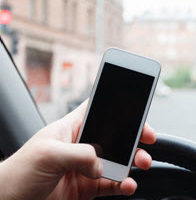U.S. Supreme Court to Review Using Cell Phone Data under Fourth Amendment

We’ve previously discussed police using cell phones and data to track people during a criminal investigation and what your Fourth Amendment rights are within that context. Fortunately, courts have historically ruled that obtaining cell phone location data to track someone’s movement constitutes a search under the Fourth Amendment, and law enforcement thus first needs to obtain a warrant to do so.
However, on November 29th, the United States Supreme Court will hear arguments in a case that could have a huge impact on the scope of the Fourth Amendment in the digital age.
The Case
The case—Carpenter v. U.S.—stems from a 2011 criminal investigation, whereby the police and prosecutors relied on cell phone location records as evidence in a conviction. Investigators specifically accessed close to 13,000 separate data points to get this evidence, and did so not only without a warrant, but without probable cause.
In this case (and in thousands of others), the government sought location data of a private individual (Carpenter) pursuant to the Stored Communications Act (SCA) instead of a warrant, claiming that they were seeking a “disclosure,” which does not require a finding of probable cause. The SCA authorizes issuance of this “disclosure” when the government can first show that there are reasonable grounds that records released will be relevant and material to an ongoing criminal investigation.
As a result, the district court ordered Carpenter’s service provider to disclose cell phone location records without first (or ever) making a probable cause finding. The U.S. Supreme Court is now taking up the issue because the United States Court of Appeals for the Sixth Circuit is divided as to whether there is a reasonable expectation of privacy in these types of location records, and has had to rely on Supreme Court precedent that is four-decades-old. In its decision, the Court will ultimately determine whether the Fourth Amendment permits the warrantless seizure and search of historical cell phone records which reveal the location and movements of the cell phone user over a number of days.
Marketers & Location Data
Interestingly, the outcome of the case could also have an impact on marketers who want to use geolocating to target specific consumers, or use location data to better gauge consumer needs and wants. And yet, tracking people’s location via mobile devices without their consent or knowledge is arguably both ethically and morally questionable.
Consult a Criminal Defense Lawyer
If you have been arrested based on cell phone data, you need to speak with an experienced criminal defense attorney right away in order to ensure that this information is not used against you as evidence.
At The Baez Law Firm, we have represented many clients whose Fourth Amendment rights were violated by police and prosecutors throughout Florida and Massachusetts. Contact us today for a consultation.
Resources:
mediapost.com/publications/article/310507/the-supreme-court-takes-up-location-tracking.html
scotusblog.com/case-files/cases/carpenter-v-united-states-2/




